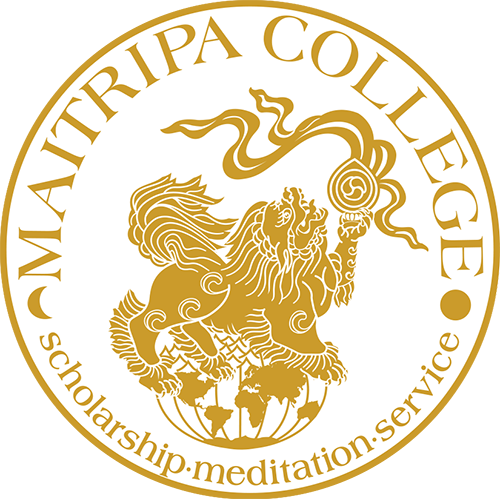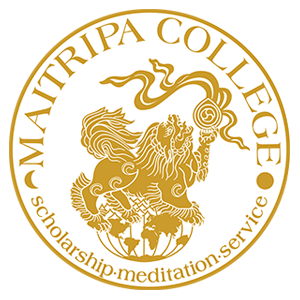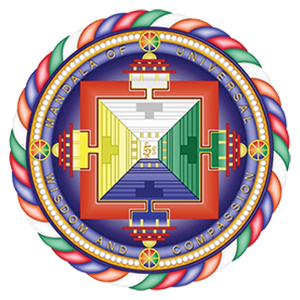In many traditions, taking refuge is the beginning of the Buddhist path, and the first step in identifying as a Buddhist, and committing to ethical guidelines by which one will engage with the world. This series of three courses, given over the course of two years, will explore each of the three jewels with an eye towards the traditional as well as contemporary, lived experience of these elements. Rooted in the framework of the explanation of the three jewels from the Uttaratantra, said to have been dictated by Maitreya to Asanga, this series of courses will ground students in traditional understandings of the three jewels according to the philosophical tradition based in the Nalanda masters and lived in some Buddhist societies and explore the bridge between those and modern implementation in our own societies.
1. The Buddha Jewel: The Teacher, The Guru
Venerable Losang Yönten & Dr. Namdrol Miranda Adams
Spring 2025
This is a hybrid class (meets onsite and online 3 hours weekly; auditing only available for out of state students)
In taking refuge in the Buddha, Buddhists look to the historical Shakyamuni Buddha as a teacher and example. Buddhists not only take refuge in the historical figure Shakyamuni, but also in the myriad enlightened beings that were said to come before him, as well as those who will follow, and in all those enlightened beings said to be teaching in our world and throughout the multiverse.
In Tibetan Buddhist Vajrayana practice, the spiritual teacher may also become an object of refuge, a relationship that has endured intense scrutiny proving itself to be potent both when it goes well, and when it goes wrong.
Part 1 of this class will explore the role of the spiritual teacher according to the tradition, the difference between a “teacher” and a “guru,” and how this relates to refuge.
Part 2 of this course will include an examination of what it means to be a “Dharma” teacher, including examining qualities and characteristics of such an individual according to the lamrim, an introduction to Buddhist pedagogy, facilitation skills when teaching Buddhism (including group facilitation skills), and principles of course planning.
2. The Dharma Jewel: Buddha Nature
Spring, 2024
Yangsi Rinpoche
In taking refuge in the Buddha, Buddhists look to the teachings that liberate from the suffering of cyclic existence. According to Maitreya’s instruction as well as the tradition of lived Buddhism, the Dharma Jewel consists of the last two of the Four Noble Truths: True Cessation, which is the cessation of all sufferings and their causes, and True Path, which brings about the attainment of such cessation.
But what does this really mean, and how do we know if our “Dharma” is doing this?
This course will examine the Dharma Jewel through the lens of the Eight Qualities of the Uttaratantra, which is meant to explain exactly that. Through a combination of philosophy and meditation instruction, students will gain both a grounding in the traditional explanations of “Buddha Nature” and their practical application in the world.
3. The Sangha Jewel: Buddhists in Community
Summer, 2024
Dr. Namdrol Miranda Adams
In taking refuge in the Sangha, Buddhists look to the Spiritual Community for sustenance and support. This course will explore ideas of community as articulated in Buddhist teachings and texts, and manifested through living Buddhist communities. We will engage in structured immersion into diverse Buddhist communities in Portland, Oregon, through which we will enter the worship spaces of local Buddhist traditions and participate in practices and community as appropriate. Following this immersion, we will research, conduct interviews, and engage in further field study to more deeply understand how Buddhists engage in community in real life.
The course will conclude with a public-facing seminar in which students will connect, share their findings, and envision how this work can support the development of Buddhist communities moving forward. This course will be informed by the pedagogy of community-based learning through readings, site visits, spiritual practices, and self-reflection. In addition to the course instructor, this course is being developed with the guidance and consultation of Yangsi Rinpoche, a traditional Tibetan teacher with over 25 years of experience teaching Western students and founder of Maitripa College; Kevin Kecskes, Professor at Portland State University, former Associate Vice Provost for Engagement and Director for Community-University Partnerships, and longtime leader in the field of Community-based Teaching and Learning; and the mentorship of Chenxing Han, author of Be the Refuge: Raising the Voices of Asian American Buddhists.


